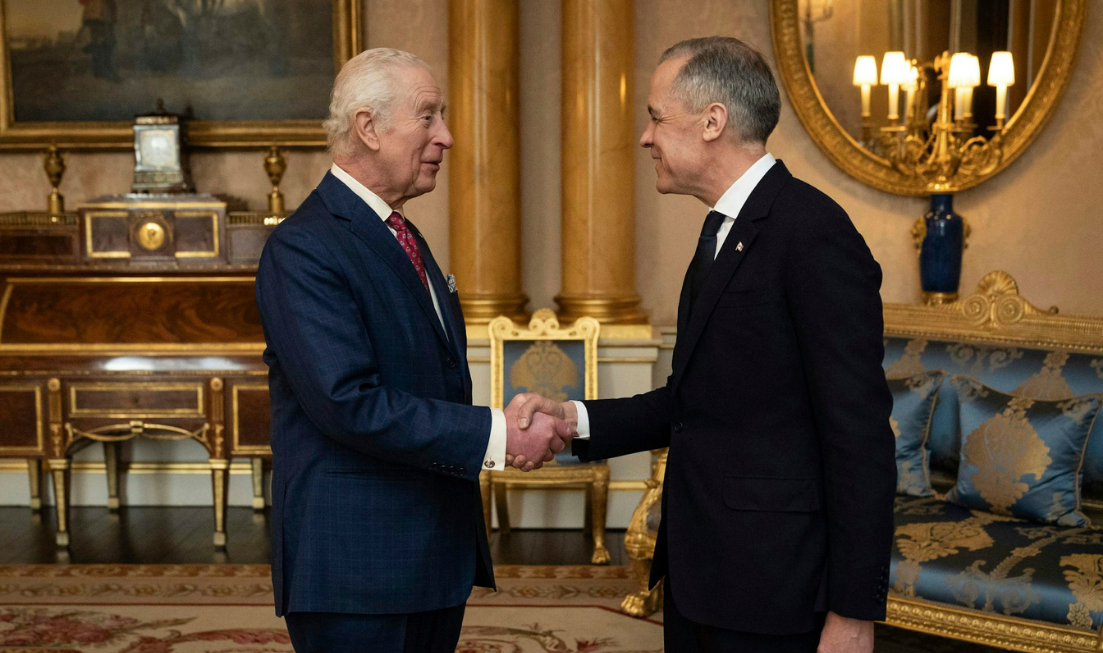Analysis: The King’s speech: The world will be watching when Charles opens Canada’s Parliament

King Charles meets with Prime Minister Mark Carney at Buckingham Palace in March 2025. (Aaron Chown/PA via AP)
BY Justin Vovk
May 7, 2025
![]() Justin Vovk is a historian at McMaster University. This article is republished from The Conversation under a Creative Commons license. Read the original article.
Justin Vovk is a historian at McMaster University. This article is republished from The Conversation under a Creative Commons license. Read the original article.
Prime Minister Mark Carney has invited King Charles to embark upon a Royal Visit to Canada and open the new session of Parliament on May 27.
The visit comes at a significant moment in Canadian history. Carney has just had his first meeting with Donald Trump, pushing back unequivocally against the American president’s continuing calls for Canada to become the 51st state.
In their Oval Office news conference, Trump once again declared his desire to erase “the artificially drawn line” separating the U.S. and Canada and to annex Canada, as Carney made clear that would never happen.
At the same time, Trump has been looking to reshape the global economic order through the use of tariffs on imported goods. Even though Canadians are fighting back with consumer and travel boycotts, many are also worrying about the future due to Trump’s actions.
Amid this turmoil, the King’s timely visit could be a powerful show of support for Canadians, whose identity has often wilted in the shadow of its powerful but formerly protective American neighbour. The presence of the King will undoubtedly generate global attention, which could provide reassurances to Canadians that they’re not alone.
Delivering the Speech from the Throne
Charles is King of Canada and the country’s official head of state. This will be his 20th trip to Canada, but his first since becoming King in September 2022.
In day-to-day government business, his duties are carried out by the Governor General. These include opening Parliament and delivering the Speech from the Throne, which outlines the government’s agenda.
The King’s visit will mark the first time the sovereign has personally delivered the Speech from the Throne since Queen Elizabeth did so in 1957. She also opened a session of Canada’s 30th Parliament in 1977.
Canada has maintained close ties with the United Kingdom. It still uses the Westminster parliamentary system. But Canada has also worked to establish its own national identity.
In 1982, Prime Minister Pierre Trudeau repatriated Canada’s Constitution. This replaced the British North America Act and established Canada’s full political independence, a process that began with Confederation in 1867.
Signals of support to Canada
Royal Visits are one of the monarchy’s most effective tools for promoting international relations. In Charles’s recent visit to Italy, he even made a point of honouring Canada.
This upcoming visit is expected to highlight Canada’s identity separate from the United States. It will give Charles the opportunity to remind everyone of the Crown’s place at the heart of Canadian sovereignty and our constitutional relationship with monarchy. This is an image that Charles has been eager to foster since becoming King in 2022 following the death of his mother and amid waning enthusiasm for the monarchy in some Commonwealth countries.
The King cannot make political statements — at least, not without the say-so of the prime minister. After meeting with Justin Trudeau in March before he was replaced by Carney as prime minister, Charles signalled his support for Canadian sovereignty through a series of subtle but important gestures.
He presented a ceremonial sword to the Usher of the Black Rod — one of the Canadian Senate’s senior ceremonial officers. A week later, Charles planted a red maple at Buckingham Palace to commemorate the late Queen Elizabeth’s support for international forestry. He even wore Canadian military insignia on his admiral’s uniform during a public inspection of a British aircraft carrier.
Commonwealth ties
The King’s visit could also reinvigorate Canada’s ties to the Commonwealth.
Canada has long maintained positive relations with the other Commonwealth countries through shared culture, military action and economic support. This Royal Visit could solidify the beneficial role of the Crown and of the Commonwealth for Canada as it seeks to assert its sovereignty and broaden its international economic ties in the face of American tariffs.
Many in Canada and around the world will be watching and listening to the King’s speech when he opens Parliament on May 27.
It is unlikely there will be any direct references to Trump’s 51st state threats or to the president himself. But its symbolic significance could reaffirm Canada’s place on the world stage. It may also help to quell, at least for a little while, the growing calls to reconsider the need for the British monarchy at all in modern-day Canada.![]()
Justin Vovk is a historian at McMaster University. This article is republished from The Conversation under a Creative Commons license. Read the original article.


